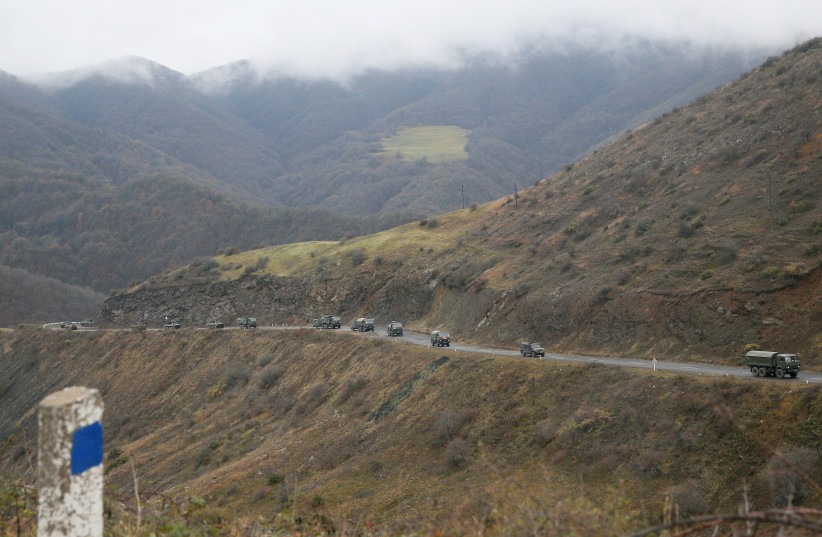Armenian officials continued to warn of a humanitarian crisis as Azerbaijan continued a blockade it intensified in mid-June on the Nagorno-Karabakh region.
Since December, Azerbaijan had been limiting or blocking traffic along the Lachin corridor, only letting limited humanitarian aid through, but the blockade reportedly intensified since mid-June.
Earlier this year, Azerbaijani forces established a checkpoint along the Lachin corridor, the only road connecting the region to Armenia, near the Armenian border, accusing Armenia of using the road to transfer military equipment to ethnic Armenians in Nagorno-Karabakh.
On June 16, the Azerbaijani APA news site reported that Azerbaijani officials had closed the Lachin corridor completely, preventing both people and goods from crossing, in response to what they said were attacks by Armenians.
According to APA, Azerbaijan would only reopen the road when "Yerevan takes responsibility for the latest provocation."

Over a month later, the blockade continues, with supermarkets reportedly sitting nearly empty, along with shortages of medicine and fuel. Power outages are also reportedly afflicting the region.
The blockade is the latest in a series of measures reportedly taken by Azerbaijani authorities that have disrupted or blocked the movement of goods and people along the Lachin corridor.
Local journalists and officials have reported a number of incidents of miscarriages occurring due to pregnant women being unable to access necessary food items, medicine, and healthcare.
In an interview with Agence France-Presse on Friday, Armenian Prime Minister Nikol Pashinyan stated that "in Nagorno-Karabakh they have created a ghetto, in the most literal meaning of the word."
"Look at the situation that we now have in Nagorno-Karabakh," added Pashinyan. "We have a humanitarian crisis there. When we say humanitarian crisis, for many people it may seem like a political term or a headline for news, but let’s delve into its substance. It means, for instance, absence of essential goods, there is no vegetable oil in Nagorno-Karabakh, no sugar, there are no hygiene supplies, there is no butter, there aren’t several types of foodstuff. The people of Nagorno-Karabakh are hard working people of course, and in this agricultural season some products are produced, but because of the absence of fuel, the delivery of the goods to the potential consumers is almost impossible."
Azerbaijani officials insist there is no blockade on the region
Despite the earlier reports by Azerbaijani media, Azerbaijani officials have recently insisted that there is no blockade and accused ethnic Armenian officials of blocking traffic and smuggling weapons and contraband from Armenia.
On July 11, Azerbaijan's State Border Service accused the International Committee of the Red Cross (ICRC) of smuggling "various types of goods" along the Lachin corridor, including cell phones, fuel, and cigarettes.
"A criminal case has been opened under the relevant articles of the Criminal Code of the Republic of Azerbaijan in connection with the above-mentioned facts, and passage through the "Lachin" state border checkpoint has been temporarily suspended until necessary investigative measures have been completed," said the State Border Service at the time.
On Saturday, Azerbaijani media posted a video purporting to show that ethnic Armenians are being let through a checkpoint along the Lachin corridor, although Armenian media claims the blockade is still in place.
Additionally on Saturday, the Armenian Armenpress news site reported that 13 ethnic Armenian patients had been transferred by the Red Cross from Nagorno-Karabakh to Armenia, although dozens of other patients are reportedly waiting to be transferred.
Additionally, on Saturday at the Shusha Global Media Forum, Azerbaijani President Ilham Aliyev claimed that it was ethnic Armenian officials, not Azerbaijani officials, causing the roadblock and insisted that the residents of the region could get any goods they needed from Azerbaijani territory.
Armenian journalists reported on Saturday that Azerbaijani officials had insisted that Azerbaijani doctors inspect patients before letting the Red Cross transfer them.
Aliyev additionally insisted that Azerbaijan will protect the rights and security of ethnic Armenians in accordance with its constitution.
The Azerbaijani president additionally referred to ongoing efforts to reach a peace deal between Azerbaijan and Armenia, stating that Armenia has already verbally recognized Nagorno-Karabakh as Azerbaijani territory, but needs to be willing to sign a document stating that for a peace deal to be reached.
In 2020, a war broke out between Azerbaijan and Armenia in the disputed region of Nagorno-Karabakh and nearby areas, ending just over a month later with a new line of contact drawn and Russian peacekeepers deployed along the line. Sporadic clashes have been reported along the line since the war.
